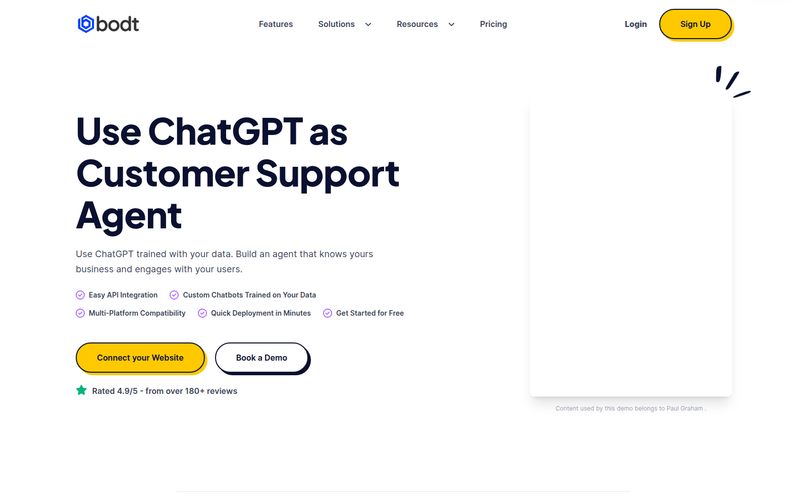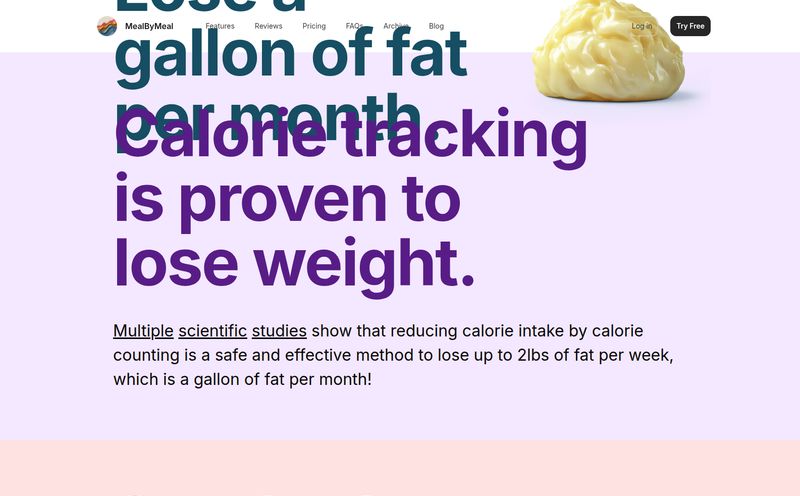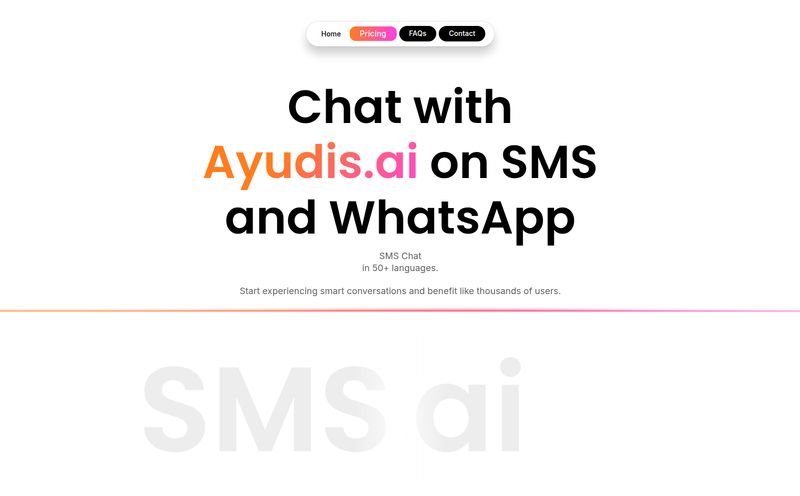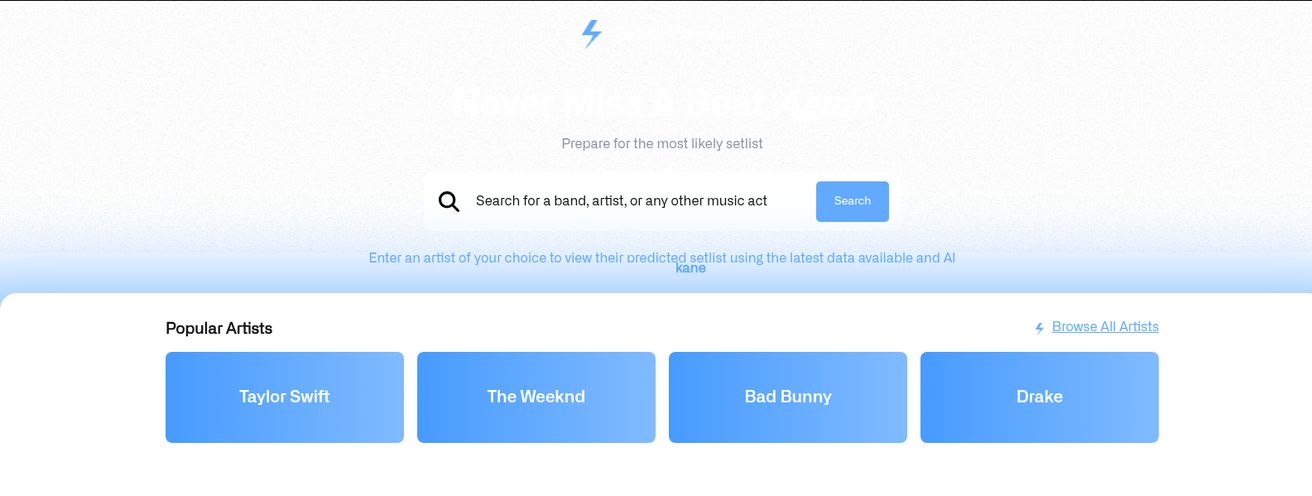The world is a pretty noisy place. We're constantly bombarded with notifications, deadlines, and the quiet pressure to have it all figured out. I've been in the SEO and traffic game for years, and I can tell you, the 'always-on' culture is real and it is exhausting. Our brains don't exactly operate on a 9-to-5 schedule, which means that 2 a.m. anxiety spike is a lonely place to be.
It's no surprise, then, that we're seeing a flood of mental wellness apps. I've tried a bunch of 'em. Some are glorified breathing timers, others are journaling apps with a fancy font. I've always been a bit skeptical of the AI chatbot trend in this space. Can a string of code really offer meaningful support? But then I stumbled across Psyfy, and my curiosity got the better of me. It promised something a little different, a bit more... substance.
So, What Exactly is This Psyfy Thing?
At its core, Psyfy is an AI-powered chatbot designed for mental wellness. But before you roll your eyes and close the tab, hear me out. This isn't your average, run-of-the-mill bot that asks "How are you feeling today?" and then offers a generic platitude. This tool is built on a pretty solid foundation: Cognitive Behavioral Therapy (CBT).
If you're not familiar with CBT, it's a super practical, evidence-based approach to mental health. The American Psychological Association describes it as a method that helps people identify and change destructive or disturbing thought patterns. Think of it as mental martial arts; you learn to recognize a negative thought, sidestep it, and reframe it into something more productive. Psyfy was designed with the help of a clinical psychologist, David Preece, which gives it a layer of credibility that many other apps just dont have.
It’s designed to be a reflective partner, a sort of coach in your pocket to help you practice these CBT strategies in your daily life. It’s not a therapist. Let me say that again, louder for the people in the back: it is not a therapist. And that's okay. It’s not trying to be.

Visit Psyfy
The Features That Actually Matter
So what does it actually do? Forget the marketing fluff, here's what stood out to me.
A Chatbot That Actually Remembers You
This is the big one for me. We've all had those infuriating chats with customer service bots where you have to repeat your account number five times. It's draining. Psyfy has a built-in memory system. It remembers important things you've shared—your goals, your struggles, that annoying coworker named Steve. It creates a continuous conversation. This transforms it from a tool you simply use into a companion you build a rapport with. It’s kinda like the difference between a random barista and your favorite one who starts making your oat milk latte the second you walk in. It just feels better.
Personalized Coaching Based on Real Psychology
Because it remembers you, the CBT coaching doesn't feel generic. If you tell it you're stressed about a presentation, it won't just say "take deep breaths." It might reference a past success you shared and help you apply the same thought patterns to this new challenge. It guides you through reframing exercises that are tailored to your situation. It’s this personalization that makes the CBT strategies feel less like homework and more like a genuinely helpful conversation.
Keeping Tabs on Your Own Progress
Psyfy includes a user profile where you can track your progress and monitor your mood over time. I’m a data guy, so I love this. Sometimes, when you’re in the thick of a rough patch, it feels like you're not making any progress. Having a simple chart that shows you've had more good days than bad ones this month can be a powerful motivator. It’s a tangible reminder that progress isn't a straight line, and that's perfectly alright.
My Honest Take on Using an AI for Mental Wellness
Alright, so here's my unfiltered opinion. The biggest win for Psyfy is accessibility. Having a space to vent and get structured, CBT-based feedback at any hour of the day or night is huge. There’s no judgment, no scheduling conflicts, and no need to even get out of bed. For someone new to mental health support or someone with a chaotic schedule, this is a game-changer.
But let's be realistic. The effectiveness of a tool like this hinges on two things. First, your own honesty and engagement. If you give it vague, one-word answers, you'll get vague, unhelpful responses. Garbage in, garbage out. You have to be willing to open up a bit. Second, and this is the big caveat, it's not human. It can't replicate the warmth, shared experience, and genuine empathy of a conversation with a friend or a qualified therapist. It’s a fantastic supplement, but not a substitute.
And then there's the privacy elephant in the room. You're sharing deeply personal information with an app. This is a concern for any app in the health space. I always advise people to read the privacy policy of any service they sign up for. Understand where your data is going and how it's being protected. It’s a necessary step in today's world.
Who is Psyfy Actually For?
I see a few groups of people who could really get a lot out of Psyfy. The busy professional who's feeling burnt out but can't find a spare hour for a therapy session. The college student overwhelmed by exams and social pressures. Or even just someone who's "CBT-curious" and wants to understand their own thought patterns better without making a huge commitment.
It's an incredible tool for building self-awareness and practicing mental fitness. However, it's absolutely not for someone in a crisis. If you are experiencing a severe mental health crisis, you need to contact a professional or a crisis hotline immediately. Psyfy is a dumbbell for your brain, not a paramedic.
The Million-Dollar Question... What's the Price?
This is the part where I wish I had a clear-cut answer for you. At the time I'm writing this, I couldn't find any public information on Psyfy's pricing. It's a newer tool, so this isn't totally surprising. My guess? It'll likely operate on a freemium model—a free basic version with a subscription for more advanced features, which is pretty standard for apps like this. I'd recommend checking out their official website for the most current details.
Is an AI Chatbot the Future of Mental Wellness?
So, where does that leave us? I went in skeptical and came out pleasantly surprised. Psyfy isn’t a magic pill that will solve all your problems. Nothing is. But it is a smart, well-designed, and psychologically-grounded tool that makes mental wellness support more accessible and less intimidating. It's a coach, a prompter, and a non-judgmental ear that fits in your pocket.
The fact that it remembers you and tailors its coaching makes it stand head and shoulders above most of the competition. While it will never replace human connection, I think tools like Psyfy represent a really positive step forward. They're empowering people to take a more active role in their own mental well-being, one conversation at a time. And in this noisy world, that's something I can definitely get behind.
Frequently Asked Questions
- 1. Is Psyfy a replacement for a human therapist?
- Absolutely not. Psyfy is a mental wellness support tool and a coach for practicing CBT strategies. It's a great supplement to therapy or a good starting point, but it does not replace the expertise and connection of a qualified human therapist. If you are in distress, please seek professional help.
- 2. How does Psyfy handle my personal data and privacy?
- This is a critical question for any app that handles sensitive information. As a user, you should always read the platform's official privacy policy to understand how your data is stored, encrypted, and used. Psyfy states it was tested for safety, but due diligence is always recommended.
- 3. Is Cognitive Behavioral Therapy (CBT) actually effective?
- Yes. CBT is one of the most well-researched forms of psychotherapy. Numerous studies have shown its effectiveness for a wide range of issues, including anxiety, depression, and stress management. It's a very practical, skills-based approach.
- 4. Is Psyfy free to use?
- As of this writing, public pricing information isn't available. Many apps in this category offer a free version with limited features and a premium subscription for full access. It's best to visit the official Psyfy website for the latest pricing details.
- 5. Who designed Psyfy?
- Psyfy was designed with input from clinical psychologist David Preece, who helped build its personalized coaching around established Cognitive Behavioral Therapy (CBT) strategies.
Reference and Sources
- What Is Cognitive Behavioral Therapy? - American Psychological Association
- Artificial intelligence for mental health and mental illnesses: an overview - Nature Digital Medicine
- Psyfy's Official Website (Note: Please search for the current official URL as it may change)



